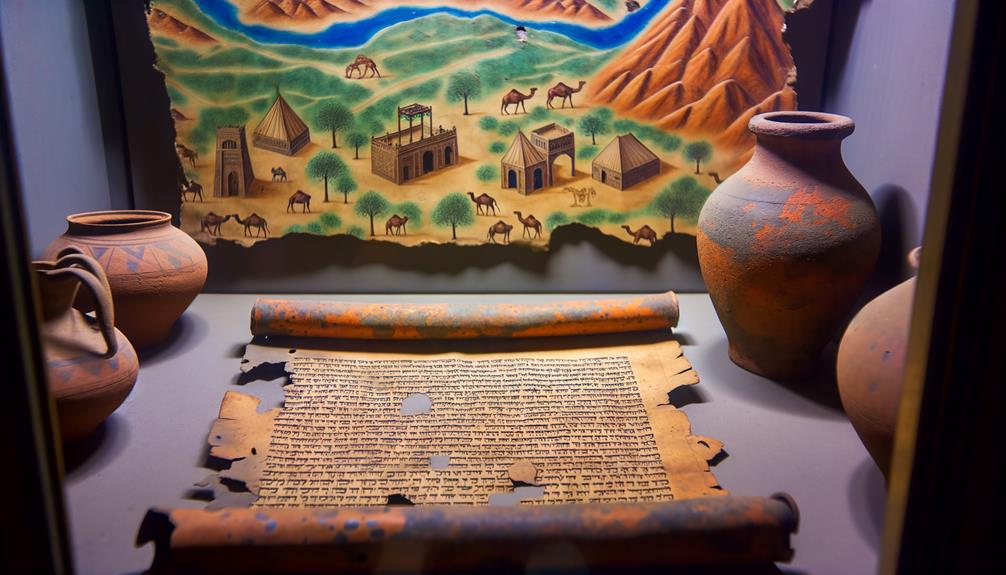Heth Meaning In The Bible: Lineage and Legacy
In the Bible, Heth is identified as a descendant of Canaan, son of Ham, situating him within the genealogy of significant Canaanite tribes. Heth is prominently the progenitor of the Hittites, an influential ethnic group in biblical narratives.
This connection underscores the Hittites’ pivotal role in the ancient Near Eastern geopolitics and their interactions with pivotal figures like Abraham. The etymology of ‘Heth’ is linked to the Hebrew root for ‘fear’ or ‘terror.’ This highlights the cultural and theological complexities present in biblical accounts.
Further exploration reveals deeper insights into these ancient narratives and their lasting impact.

Heth Meaning in the Bible: Ancestry, Symbolism, and Biblical Significance
| Aspect | Biblical Insight |
|---|---|
| Name Meaning | Heth means “terror” or “fear” in Hebrew. |
| Biblical Lineage | Heth is a son of Canaan, grandson of Ham (Genesis 10:15). |
| Associated Nation | Ancestor of the Hittites, a prominent people in the Old Testament. |
| Key Scripture | Genesis 23 – Hittites interact with Abraham when he purchases Sarah’s burial site. |
| Cultural Role | The Hittites were part of Canaanite tribes living in the Promised Land. |
| Symbolic Meaning | Often symbolizes opposition or obstacles to Israel’s spiritual inheritance. |
| Historical Significance | Reflects the broader Canaanite influence in biblical narratives. |
Origin of Heth

The origin of Heth, a figure mentioned in the Bible, can be traced back to the genealogies of the Old Scripture, where he is identified as a descendant of Canaan, the son of Ham.
This identification situates Heth within the broader context of the ancient Near Eastern lineage, highlighting his role within the ethno-historical framework of the region.
The character of Heth is primarily linked to the Hittites, a prominent group in biblical narratives.
This connection suggests a deeper, underlying significance to his mention, reflecting the intertwining of historical and theological narratives.
Understanding Heth’s origin provides essential insights into the cultural and historical backdrop of biblical texts, enabling a more nuanced interpretation of the scripture’s genealogical records.
Heth in Biblical Genealogy

In examining Heth’s role within biblical genealogy, it is essential to first consider his position as a descendant of Canaan, himself the son of Ham.
This lineage situates Heth among the prominent Canaanite tribes mentioned throughout the Old Scripture.
Additionally, the descendants of Heth, known as the Hittites, played a significant role in the historical and theological narratives of ancient Israel.
Heth’s Ancestral Lineage
As a descendant of Canaan, Heth holds a significant position in the genealogical records presented in the Bible. According to Genesis 10:15, Heth is the second son of Canaan, placing him within the broader lineage of Noah through Ham.
This genealogy establishes Heth as a progenitor of the Hittites, an ancient group that becomes prominent in subsequent biblical narratives. The genealogical listings serve not only to trace lineage but also to delineate the relationships among various ancient peoples.
Heth’s position underscores the interconnectedness of the Canaanite tribes and their historical significance. By examining these records, scholars gain insights into the socio-political landscape of the ancient Near East and the pivotal role of Heth’s lineage within it.
Descendants of Heth
Tracing the descendants of Heth provides essential insights into the formation and development of the Hittite civilization, which played a pivotal role in the history of the ancient Near East.
Heth, identified as a son of Canaan in the Table of Nations (Genesis 10:15), is traditionally seen as the progenitor of the Hittites. Biblical genealogies, supported by historical records, reveal that the Hittites emerged as a significant ethnic group with a distinctive culture and political structures.
They occupied a vital geographic region encompassing modern-day Turkey and parts of Syria. Analyzing their lineage elucidates their interactions with other ancient civilizations, such as Egypt and Assyria, thereby enriching our understanding of the complex socio-political landscapes of the era.
The Hittites Connection

The Hittites, often associated with the descendants of Heth, play a significant role in biblical narratives and historical accounts.
Their origins, rooted in the ancient Near East, provide critical insights into the cultural and political landscape of the region.
Analyzing their mention in the Bible elucidates their interactions with key biblical figures and the broader implications for understanding ancient history.
Origins of Hittite People
Delving into the origins of the Hittite people reveals a complex tapestry of migrations, cultural amalgamations, and historical developments that greatly influenced the ancient Near East. Emerging in Anatolia around 1600 BCE, the Hittites established a significant empire known for its advancements in law, politics, and military strategy. Their origin story can be elucidated through several key factors:
- Migrations: The Hittites are believed to have migrated from regions north of the Black Sea, integrating with local populations.
- Language: They spoke an Indo-European language, distinguishing them from their Semitic and Hurrian neighbors.
- Cultural Amalgamation: The Hittite culture blended native Anatolian, Mesopotamian, and Syrian influences.
- Archaeological Evidence: Excavations, such as those at Hattusa, provide critical insights into their society and governance.
Hittites in Biblical Context
Within the biblical narrative, the Hittites are frequently mentioned as one of the prominent groups inhabiting the land of Canaan during the time of the patriarchs and the Israelite conquest.
Their presence is noted in various passages, such as the account of Abraham purchasing the Cave of Machpelah from Ephron the Hittite (Genesis 23:10-20).
The Hittites are also listed among the nations that the Israelites were commanded to displace (Deuteronomy 7:1).
These references suggest a complex interaction between the Hittites and the Israelites, involving both peaceful transactions and military confrontations.
The biblical portrayal of the Hittites underscores their significant role in the historical and cultural landscape of ancient Canaan, highlighting their influence and interactions with the emerging Israelite nation.
Heth in Old Testament Stories

In Old scripture narratives, Heth is often depicted as the progenitor of the Hittites, a significant group frequently mentioned in the context of the patriarchal stories. These narratives highlight the Hittites’ interactions with key biblical figures, underscoring their role in the unfolding events of the Old covenant.
- Genesis 23:3-20: Abraham negotiates with the Hittites to purchase the cave of Machpelah, establishing a burial site for Sarah.
- Genesis 27:46: Rebekah expresses concern over Jacob marrying a Hittite woman, reflecting cultural tensions.
- Exodus 23:28: God promises to drive out the Hittites from the Promised Land, indicating their presence and influence.
- Joshua 1:4: The Hittite territory is included within the land promised to the Israelites, signifying its importance.
This coverage of Heth’s descendants elucidates their substantial impact on biblical history.
Etymology and Symbolism

The etymology of ‘Heth‘ traces back to the Hebrew root ‘חֵת,’ which is often associated with fear or terror, reflecting the formidable presence of the Hittites in biblical narratives.
This term conveys a sense of awe and dread, pertinent to the Hittites’ significant role as both adversaries and neighbors to the Israelites.
Symbolically, ‘Heth’ represents the broader themes of conflict and cultural interaction in the biblical context.
The Hittites, notable for their advanced civilization and military prowess, embodied a palpable sense of danger and respect.
This duality of fear and reverence encapsulates the nuanced relationship between the Israelites and their contemporaries, highlighting the complexities inherent in ancient Near Eastern geopolitics and theology.
Theological Implications of Heth

Understanding the theological implications of ‘Heth’ requires an exploration of how the Hittites’ depiction in biblical texts influences interpretations of divine justice, covenantal relationships, and the broader narrative of Israel’s history.
The Hittites, descendants of Heth, are often portrayed as antagonists to Israel, shaping theological discourse in several ways:
- Divine Judgment: The Hittites’ fate often illustrates themes of divine retribution and justice.
- Covenant Dynamics: Their interactions with the Israelites highlight the complexities of covenantal fidelity and breach.
- Ethical Lessons: The moral failings depicted in these narratives serve as didactic examples for Israel.
- Historical Context: Understanding Heth provides insight into the historical and cultural backdrop of Israelite-Hittite relations.
These elements collectively contribute to a nuanced understanding of biblical theology.
Conclusion
The exploration of Heth in biblical contexts reveals a complex tapestry of genealogical, historical, and theological dimensions.
As seen, Heth’s lineage intertwines with the Hittites, enriching Old Scriptures narratives and imbuing them with deeper significance.
The etymology and symbolism of Heth further enhance understanding, underscoring its multifaceted role in biblical lore.
‘To understand the present, one must first understand the past,’ aptly applies here, as the study of Heth elucidates broader theological implications within biblical scholarship.






